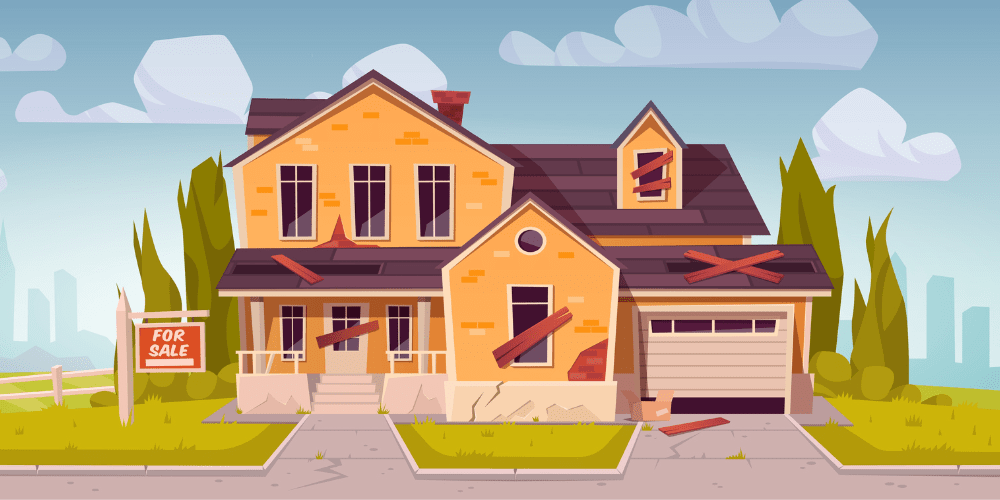What Is a Probate Sale? | Should You Buy a House in Probate? | How to Buy Probate Real Estate | How to Sell a Property in Probate
Purchasing real estate in probate comes with more risk than most people realize.
Probate is a legal process that transfers ownership of assets after someone dies. To help facilitate the transaction, the court typically appoints an estate executor to oversee the transfer of property.
A probate sale, then, is a sale during which an estate executor sells property in probate.
Because property in probate usually costs less than traditional property, investors and other buyers looking for a bargain frequent probate sales. But there are trade-offs with the cheaper price tag.
Probate sales often take longer because of court involvement. Plus, the home may need repairs since estate administrators typically sell probate properties “as is.”
Carefully weigh the pros and cons before you put in an offer on a property in probate. We recommend working with a real estate agent who has experience in probate properties. If you don’t follow probate rules, the sale might not go through.
What Is a Probate Sale?
In real estate, a probate sale is the sale of a home under the supervision of a probate court, usually because the homeowner dies without leaving a will, beneficiary deed, or a trust to dictate how to transfer their property to heirs.
Probate property is typically sold as is and can come with real estate restrictions.
What’s the Difference Between a Probate Sale and a Typical Real Estate Sale?
The main difference between a probate sale and a typical real estate transaction is that a probate sale requires court involvement, which can add additional steps and cause delays during closing.
How Does Property End Up in Probate?
When a person dies, they usually leave behind a will that specifies what to do with their property and possessions. Sometimes, however, the terms of a will are unclear or the person passes away without one. When that happens, the court gets involved and the property ends up in probate.
Should You Buy a House in Probate?
| ✅ Pros | ❌ Cons |
|---|---|
|
|
Probate sales can be a great opportunity to get property for less in a competitive market, but they are more complex than a typical real estate sale and can take longer because of specific legal rules. For example, the court may need to review your offer and hold a hearing to approve the sale.
Expect a Longer Timeline
Probate sales can take a few more weeks than a traditional sale to allow time for the court to approve the sale, or it could take years if the heirs can’t agree and draw out a court battle. How much longer a probate sale can take depends on several factors:
- Supervision: If the probate is unsupervised, there’s less court oversight. A supervised probate procedure requires more court involvement, which can slow things down.
- An unclear will: If there is no will or an unclear will, a messy estate can also cause delays.
- A disagreement between heirs: The sale can be delayed if the property has multiple beneficiaries and they can’t agree on whether to sell it.
- Property liens: If the property deed has liens against it, you can expect the sale to be pushed out until the issues are resolved.
You’ll Face Less Competition
The plus side of buying a home in probate is that there are usually fewer interested buyers, so you may have less competition when you find a property that interests you.
Prices Are Lower But Don’t Underestimate the Cost of Repairs
Probate houses are typically (though not always) priced lower than other houses because they are often sold “as is” and they may be run-down or need repairs. Fewer buyers are willing to take on these projects, so you may find less competition.
However, don’t expect a significant price drop. Some state laws require that houses in probate sell for at least 90% of the appraised value.
How to Buy Probate Real Estate
Find Probate Real Estate
Search Multiple Listing Services (MLS). You can find probate properties on your local multiple listing service (MLS) and on listing sites like Zillow and Realtor.com. Although you can’t filter results to specifically show probate sales, you can search for keywords (such as “probate”) within the listing.
Word of mouth. A savvy realtor can use their professional network to find probate properties for sale, so it’s worth having an agent on your side if you’re specifically looking for a probate estate.
Check obituaries. It may sound morbid, but checking online obituaries of a location where you’re interested in buying property can lead you to probate sales. You can also check local newspapers for notices to creditors in order to get a head start on finding properties before they’re listed for sale.
Work With an Agent to Navigate the Sale in Compliance With Local Law
If you’ve never purchased a probate property before, it’s legally and financially risky to try to do it on your own. Work with an agent who’s experienced in probate sales to help you:
- Find the right property
- Understand any sales restrictions or added legal steps
- Make an offer that complies with any restrictions
- Close the sale on the terms and price that work for you
Once you find a probate property you like, you can make an offer as you would in a regular real estate sale, except there may be some specific circumstances you might need to know before you buy the house. Work with the estate executor and an experienced real estate agent to make sure you’re covering all your bases.
For example, an agent would know if the property requires a larger earnest money deposit or doesn’t allow contingencies. Without contingencies, you could be on the hook to buy the house even if a home inspection turns up termite damage or the bank denies your loan because the appraisal comes in below your offer amount.
How to Sell a House in Probate
If you’re selling inherited property, you must know and follow the court rules. For example, the executor could choose a real estate agent to list the property for sale.
Read these resources to learn more about the process and how to get the most of your sale:
- Selling Inherited Property: How to Get the Most Out of Your Sale
- How Long Does an Executor Have to Sell a House? Here’s a Realistic Timeline
- If Multiple People Inherit a House, Do All Heirs Have to Agree to Sell Property?
We highly recommend working with a seller’s agent who’s experienced in probate sales to help you get through the complicated probate process.
Recommended Reading
FAQ
How long does a probate sale take?
A probate sale can take anywhere from a couple of weeks to a couple of years, depending on which state the sale is taking place in and the state of the deceased person’s estate. Learn more about probate sales.
Are probate sales cash only?
No, probate sales aren’t cash only, but they are usually sold “as is,” meaning they might need some substantial repairs and renovations. Learn more about probate sales.
Can a house be sold under probate?
Yes, a house can be sold under probate as long as there aren’t liens on the property or other complications with the title. Learn more about probate sales.
How long does it take for a probate sale to go through?
A probate sale can take anywhere from a couple of weeks to a couple of years to go through, depending on which state the sale is taking place in and the state of the deceased person’s estate. Learn more about probate sales.



